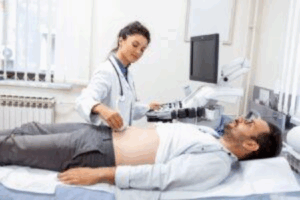
At ImageCare Radiology, we’re proud to provide high-quality ultrasound in Morristown, NJ, where advanced imaging meets compassionate care. We understand that choosing a diagnostic imaging center is an important part of your healthcare journey. That’s why our team focuses on comfort, accuracy, and affordability, ensuring every patient feels cared for and confident in their results.
In addition to ultrasound services, we also offer MRI, X-ray, and CT scans, allowing you to receive all your diagnostic imaging needs in one convenient location.
What Is an Ultrasound?
An ultrasound, also known as a diagnostic ultrasound or sonogram, is a safe, painless imaging technique that uses high-frequency sound waves to create detailed pictures of the body’s internal organs and tissues.
During the exam, a small device called a transducer sends sound waves into the body. These waves bounce off internal structures and are captured to form clear, real-time images on a screen. Because ultrasound imaging uses sound instead of radiation, it’s safe for patients of all ages, including pregnant women and children.
What is an Ultrasound Used For?
While many people associate ultrasounds with pregnancy, this versatile technology can help diagnose and monitor a wide variety of health conditions. Ultrasound exams can evaluate:
- Abdominal Organs: Including the liver, pancreas, kidneys, and spleen.
- Reproductive Organs: To assess the uterus, ovaries, or testicles.
- Thyroid Gland: To detect nodules or cysts.
- Vascular System: To examine blood flow in arteries and veins.
- Muscles and Soft Tissue: To identify injuries, swelling, or cysts.
Ultrasounds are also frequently used as guidance tools during medical procedures. A sonographer can help physicians visualize specific organs or areas to safely guide a biopsy or fluid drainage.
What to Expect During an Ultrasound
Ultrasound exams are simple, non-invasive, and typically last between 30 and 45 minutes.
- Before Your Appointment: Most ultrasounds require little preparation, but certain exams, such as abdominal or pelvic scans, may involve fasting or having a full bladder. We’ll provide detailed instructions when you schedule.
- During the Exam: You’ll recline comfortably while a technologist applies warm gel to your skin. This helps the transducer glide smoothly and ensures clear imaging. You may feel slight pressure as the device moves, but the test is completely painless.
- After the Exam: A board-certified radiologist will review your images and send a detailed report to your referring doctor, who will go over the results with you.
Is an Ultrasound Safe?
Yes. Ultrasound procedures are among the safest forms of diagnostic imaging. Because they use sound waves rather than radiation, there are no harmful effects when performed by trained technologists. Ultrasounds are safe for everyone, including infants, children, and pregnant women.
The ImageCare Difference
At ImageCare Radiology, we believe every patient deserves clear answers delivered with care. From scheduling your appointment to reviewing your results, our staff is here to make the process smooth and stress-free.
Our ultrasound clinic in Morristown combines state-of-the-art imaging equipment with a compassionate, patient-centered approach. If you have any questions before your visit, our friendly team will be happy to assist.
Call today to schedule your appointment and experience the ImageCare difference, where expertise and empathy meet.
Frequently Asked Questions About Ultrasound in Morristown, NJ
How do I prepare for my ultrasound at ImageCare Radiology in Morristown?
Preparation varies by the type of ultrasound. Some exams require fasting or a full bladder, while others require no preparation at all. When you schedule your appointment, our team will explain exactly what’s needed.
How soon can I expect to receive my ultrasound results?
Your ultrasound images are reviewed promptly by one of our radiologists, and your doctor typically receives a detailed report within a few days. Your provider will then review the findings with you.
Can I have multiple imaging tests at ImageCare Morristown?
Yes! In addition to ultrasounds, we also offer MRI, CT, and X-ray services at our Morristown location — making it easy to complete all your imaging in one convenient visit.
